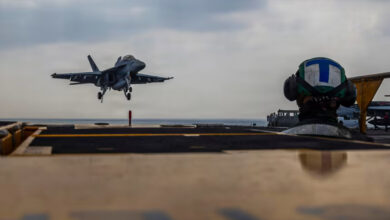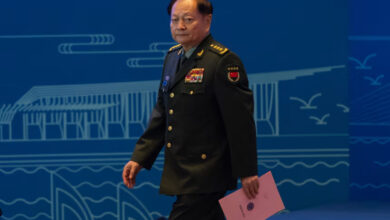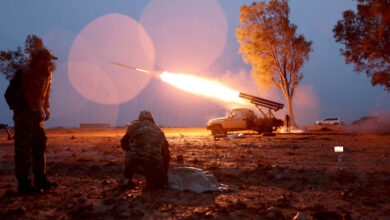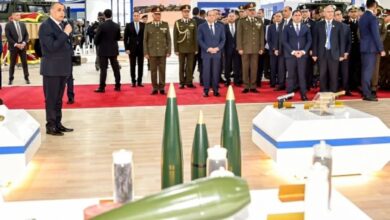Security forces fired shots into the air and violently dispersed a protest late Monday night outside the Libyan Embassy in Zamalek.
Responding to the shots, about 50 demonstrators – mostly comprised of Libyan expats and Egyptians of Libyan descent who oppose the government of Libyan leader Muammar Qadhafi – ran down a side street toward 26th of July Street, the main thoroughfare in Zamalek.
The normally peaceful neighborhood briefly broke out into chaos around 11 pm as Central Security Forces and military forces beat protesters with truncheons, batons and tasers, while attempting to drag them back to the embassy. About 15 children were among the demonstrators.
“We got them back,” said one male activist, among the protesters who the security and military forces tried to bring back to the embassy. He declined to be named to protect the safety of himself and his family members still residing in Libya.
Before the attack began, three protesters were arrested – two Libyans and one Egyptian – according to many present. All three are allegedly being held at the Qasr al-Nil police station.
One demonstrator, who would only offer his name as A.A. for security reasons, recalled seeing one security officer running down the street chasing after protesters, “waving his gun as if it were a toy,” and firing into the air.
Aida al-Kashef, an Egyptian filmmaker who lives close by to where the protest was taking place, said that she was parking her car near the embassy when she heard the gunshots.
"There were a lot of women and children. And [the protesters] were beaten really badly; they were beaten by the police and the army together,” she said. “Each person had at least 10 to 15 soldiers around them, hitting him or her.”
Following the violence, a teenage boy laid on the ground injured next to a kiosk on 26th of July Street. Those gathered around him told Al-Masry Al-Youm he had been tasered in the back. An ambulance showed up after about an hour and transported him to a nearby hospital.
Different eyewitness accounts indicated confusion as to why security forces began firing into the air.
Activist Nora Shalaby, who arrived later and spoke with many of the Libyan protesters, was told that security forces attempted to arrest a protester near the barricade and were repelled, which might have prompted the violent response.
Kashef, who spoke with some military forces, said was told that they began to fire in the air after a few young male protesters attempted to attack the head military officer.
Nina, another protester who was leaning against a car near the injured boy, surrounded by friends, could find no explanation as to why the firing started.
"We were just singing” when the firing started, she said, with tears in her eyes. She declined to provide her surname for fear of retribution.
Advocates of the National Transitional Council, a Libyan political body now recognized by the US, UK, France and other major Western powers, had gathered outside the Libyan Embassy around 1 pm on Monday to demonstrate their support for the Libyan rebel movement and opposition to the Qadhafi government, which is still represented at the embassy.
They could be heard chanting “God is great," “Egypt and Libya, we stand together,” and prayers to give strength to the rebels fighting back in their home country.
A few protesters alleged that shots had been fired when the protest began and that protesters attempted to push their way into the Libyan Embassy at around 1 pm. One man showed Al-Masry Al-Youm a bullet casing he claimed to have recovered from the shots. This allegation could not be confirmed.
The demonstrators' specific purpose was not entirely clear. They detailed various goals and grievances with the Libyan Embassy and claimed that the protest was unrelated to the arrival of the Libyan interior minister in Cairo earlier in the day.
One man, who described himself as an exile who could not identify himself for fear of retribution, said the protesters wanted to speak to the Libyan ambassador directly.
"To tell [the ambassador] to leave the embassy, bring the plaque down, and get the hell out,” he said of their goals. “Everybody inside is from the Qadhafi regime.”
He alleged that the regime has been distributing checks of US$250 to Egyptians of Libyan origin to try and compel them to travel to Libya and fight for Qadhafi's forces.
"We were only trying to put the [rebel] flag up,” said a female activist of the protesters' motivations. She showed Al-Masry Al-Youm a large rebel flag she had wrapped around her shoulders as proof. Like the others, she declined to provide her name for security reasons.
The protesters said that though they did not know each other previously, they have begun to see each other at Libyan political events since the political sphere in Egypt opened up after the ouster of former President Hosni Mubarak.
Before the protest was dispersed, the mood was tense yet lively. Young children and adults draped themselves in the flag adopted by the rebel movement, singing revolutionary songs and chanting against the Qadhafi regime. One protester waved his baby, whose cheek was painted with the rebel flag, in the shielded faces of the police officers.
About 100 military and security forces barricaded the street on the west side of the embassy, preventing protesters from entering there. They eventually pushed the barricade forward to the other side of the street to allow traffic through on the streets in front of the embassy.
Kashef said that Egyptians from the neighborhood were not at all bothered by the protest.
"This was a bit unexpected in this neighborhood,” she admitted. Yet, she went on, “[neighborhood residents] were trying to calm the army. They were not trying to push the Libyans away, or angry, or screaming at the Libyans.”
A few military soldiers attempted to explain to Kashef that although they had orders to disperse the demonstrators, the military was acting calmly and hoped that the protesters would go home on their own accord.
Before the protest was dispersed, Nina started warning others that the military and security forces were about to attack the protesters. She proved to be right.




